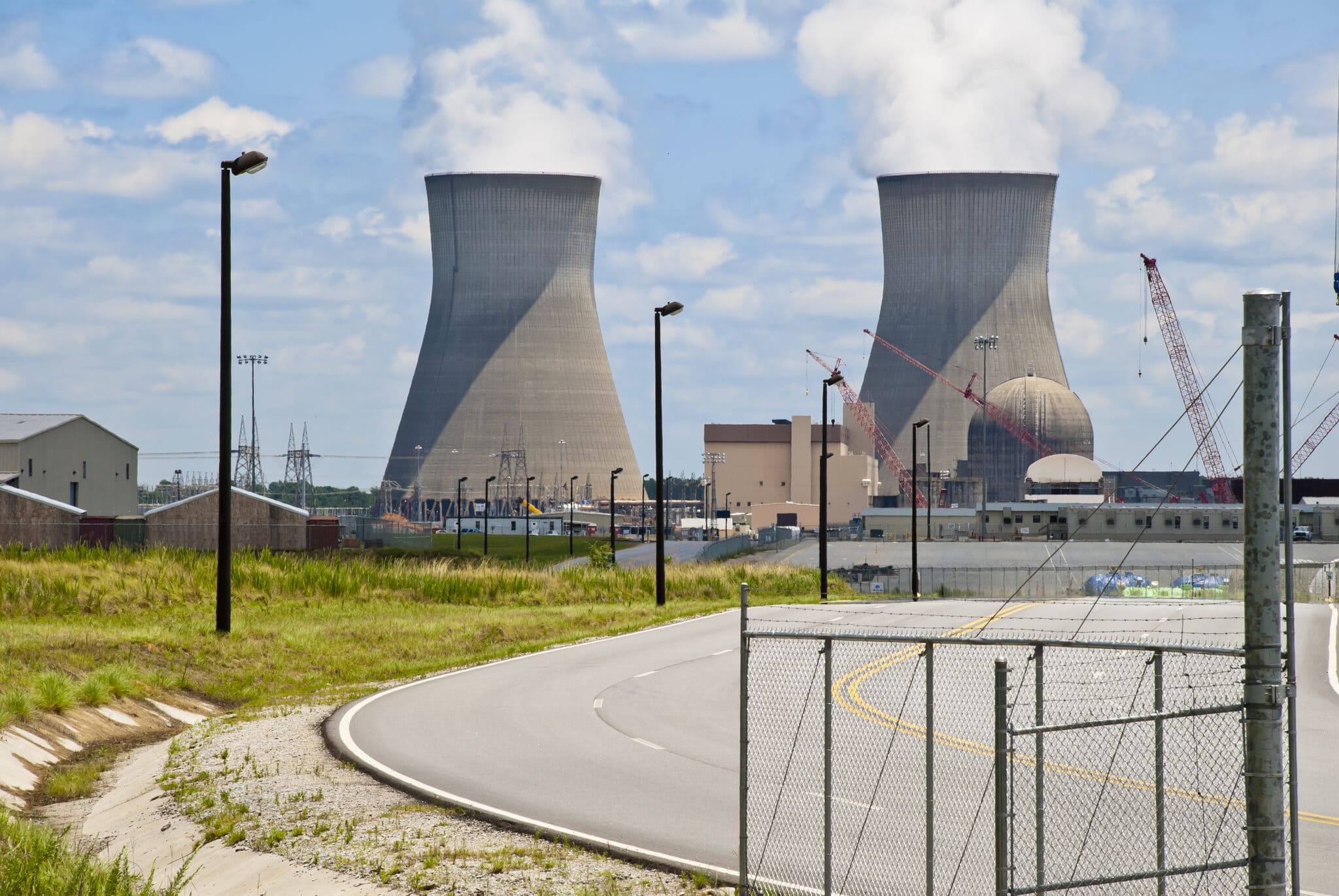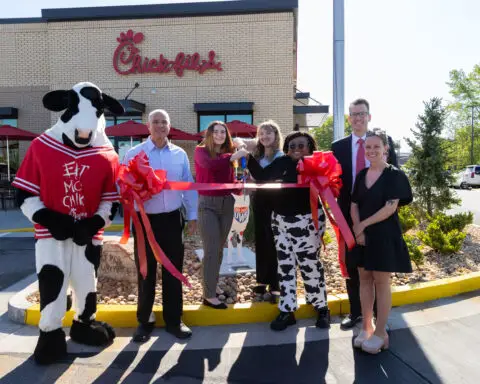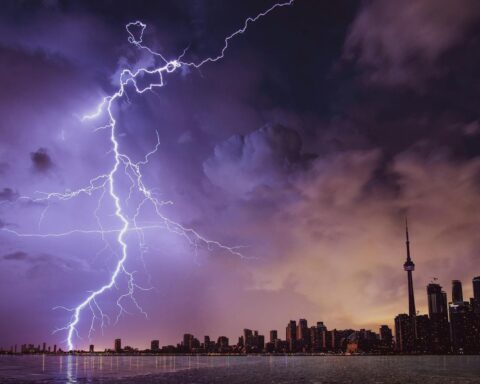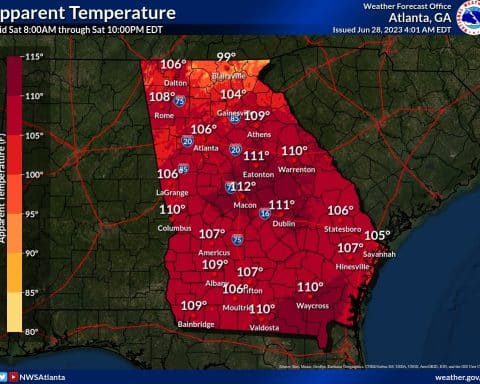The debate surrounding Georgia Power’s Plant Vogtle expansion raged on Thursday during the latest installment of state regulators considering the controversial nuclear expansion project, which has doubled in cost and taken seven years longer to build than initially planned.
A utility watchdog, Vogtle monitors and analysts from the Georgia Public Service Commission testified at Thursday’s hearing on Georgia Power’s $35 billion nuclear plant that is supposedly nearing completion at last in Burke County southeast of Augusta.
Georgia Power and other Vogtle promoters tout the benefits of nuclear power as a provider of a reliable and zero-carbon energy supply for the next 60 to 80 years. A number of utility analysts and clean energy and consumer advocates have long argued that the project’s benefits will not outweigh the ballooning costs customers will be stuck with in the long haul.
According to the state regulators’ Vogtle consultants, the company could collect $2.1 billion more from ratepayers over the course of construction than it would if the two-phase expansion had been finished in 2016 and 2017. Georgia Power officials are now targeting to have Unit 3 reactor completed this summer after missing an announced June completion date, and Unit 4 is projected to enter service by early 2024.
On Thursday, 77-year-old Annie Stephens, a resident of Shell Bluff, an unincorporated community near Vogtle, asked commissioners how they thought the residents of Burke County would be able to absorb the expensive project. The hearing for Vogtle’s 28th monitoring report updated costs and progress between June 2022 and December 2022.
“How do y’all think that we are going to be able to pay the light bills?” Stephens said.
Public Service Commissioner Lauren “Bubba” McDonald responded that the power produced by the Unit 3 and 4 reactors will be among the cheapest and cleanest in the state and compared Vogtle to buying a new car for better mileage.
“You’re going to be saving on the fuel costs but you still have to pay for the car,” he said.
Steven Prenovitz, a consultant with the Concerned Ratepayers of Georgia, blasted the regulatory process monitoring Vogtle as a systemic failure that led to ballooning costs that he derided as “fiscal insanity.”
The company’s ratepayers are now paying off a recent fuel cost adjustment and electric base rate totaling $10 billion. The company’s customers have also been paying a separate tab for Vogtle since 2009, which PSC consultants estimates could total $926 per year for the typical household by the time that the expansion is completed.
Prenovitz criticized the Waynesboro nuclear facility’s primary owners, Southern Nuclear and Georgia Power, for failing to control construction costs and shifting most of the burden to ratepayers. Since the beginning of Vogtle, PSC staff, legislators, and former Gov. Sonny Perdue’s office has been complicit with Georgia Power, resulting in $18 billion in cost overruns, he said.
“Perhaps their judgment was paralyzed when confronted by Georgia Power witnesses, lobbyists, PR efforts, executives, and attorneys,” he said. “The media was not much better. This is an example of the deer in the headlights syndrome.”
McDonald challenged Prenovitz’s claim that other states have realized nuclear power is a lost cause not worth investing in.
Vogtle is the only nuclear power plant in the country under construction, and it will be the first new reactor in 40 years to come online in the U.S.
Meanwhile, nuclear energy development is gaining traction in the coal-dominated states of Kentucky and West Virginia. As state leaders look toward a clean energy transition, Kentucky lawmakers formed a nuclear exploratory committee this year and West Virginia officials lifted a nuclear power ban in 2022.
McDonald said that Georgia Power owns 46% of Vogtle, making it the plant’s majority owner, but the co-owners are involved in the decision-making process.
Vogtle’s co-owners Oglethorpe Power Corp., Municipal Electric Authority of Georgia, and Dalton Electric, have sued Georgia Power over cost overruns. Georgia Power agreed to pay the municipal authority, which operates 49 city-owned electric systems, at least $76 million as part of a lawsuit settlement in 2022.
“Collectively it’s always been continue to build and finish these plants,” McDonald said. “Yes, there’s been problems with i.e., Georgia Power and a lot of those problems will be looked at as prudency reviews come along for the power company.”
On Wednesday, Unit 3 completed its final pre-operational test and is now undergoing its final checkup before it is supposed to be gradually brought into commercial operation. Meanwhile, a functional test on Unit 4 was successfully completed in 42 days, about a third of the time it took the third rector to complete the same test.
Georgia Power attorney Steven Hewitson said that technical problems encountered during Unit 3’s testing phases are being used to speed up the final reactor’s construction. Moreover, he noted the improvements in the final stages since Georgia Power and Southern Nuclear took over from contractor Westinghouse Co., which declared bankruptcy in 2017.
“The owners and Southern Nuclear had a longer runway to control the construction on Unit 4 than they did Unit 3 given the state of construction when they took over from Westinghouse,” Hewiston said.
Liz Coyle, executive director of consumer protection advocate Georgia Watch, questioned why Georgia Power officials told regulators that they didn’t need to factor in contingencies for Vogtle during the debate over whether to build nuclear reactors instead of natural gas-fired combined cycle units. Combined cycle units use both a gas and steam powered turbine to produce electricity.
“When the company testified at certification that no contingency was needed on such a complex project, would that in part be because they had to show this commission that it would be more economic, more competitive to build Vogtle 3 and 4 than to meet the forecast capacity needed for a combined cycle?”
Georgia Recorder is part of States Newsroom, a network of news bureaus supported by grants and a coalition of donors as a 501c(3) public charity. Georgia Recorder maintains editorial independence. Contact Editor John McCosh for questions: info@georgiarecorder.com. Follow Georgia Recorder on Facebook and Twitter.
The form you have selected does not exist.







